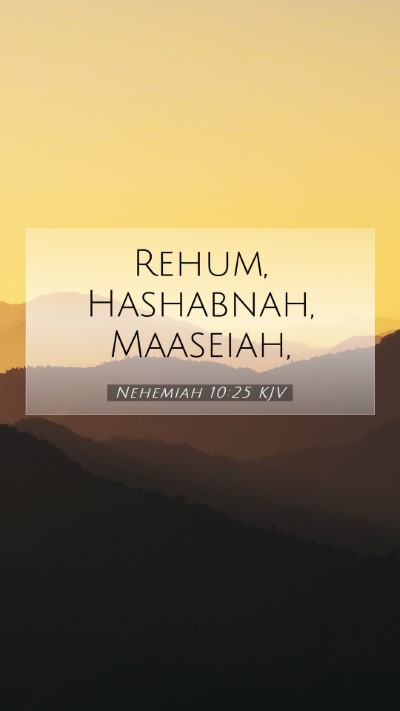Understanding Nehemiah 10:25: A Comprehensive Commentary
Nehemiah 10:25 reads:
"And we cast the lots among the priests, the Levites, and the people, for the wood offering, to bring it into the house of our God, after the houses of our fathers, at times appointed year by year, to burn upon the altar of the Lord our God, as it is written in the law."
This verse, situated within a covenant renewal context, reflects the commitment of the Israelites to sustain the worship of God through systematic offerings. Let us delve deeply into the meaning and implications of this scripture through the insights of noted public domain commentaries:
Verse Meaning and Context
Nehemiah's rebuilding of Jerusalem necessitated not just physical restoration but also a revitalization of spiritual practices. This passage underscores the communal responsibility the Israelites felt towards maintaining the temple sacrifices, showing a dedication to their covenant with God.
Historical Background
The Jews, having returned from Babylonian exile, recognized the importance of reestablishing their worship rituals. They are reaffirming their commitment to God as a community. Albert Barnes emphasizes that this act of casting lots represents a method of making collective decisions, which fosters unity among the people.
Commentary Insights
Matthew Henry:
Henry discusses the importance of the wood offerings as central to the sacrificial system. He points out that these offerings are not only practical but deeply spiritual, as they symbolize a desire to honor God. The act of casting lots signifies reliance on divine oversight in sharing responsibilities, thus demonstrating humility and collective faith.
Albert Barnes:
Barnes highlights that the meticulous arrangement of offerings speaks to the seriousness with which the Israelites approached their worship obligations. By organizing these sacrifices yearly, they ensure that their devotion remains consistent and directed according to the dictates of the Law.
Adam Clarke:
Clarke notes the significance of the wood offering, stating that it was a necessity for the altar's fire to ensure continual worship. He adds that the manner in which the people went about this task showcases their commitment to obeying God's commandments as prescribed in the scriptures.
Spiritual Applications
This verse invites readers to consider the importance of structured worship in their lives. The commitments made by the Israelites can serve as a model for contemporary believers to engage in regular acts of service and devotion. Here are some applications:
- Commitment to Worship: Establish a regular routine for personal and communal worship.
- Shared Responsibility: Engage in group activities that promote spiritual growth and responsibility.
- Obedience to God’s Word: Reflect on how the teachings of Scripture shape your life.
Bible Cross References
For further understanding, consider these related verses:
- Leviticus 6:12-13: Discusses the ongoing fire on the altar, essential to the sacrificial system.
- Ezra 3:2: References the commitment to rebuilding the altar for burnt offerings.
- Malachi 1:8: Addresses the importance of offering pure sacrifices to God.
Conclusion
Nehemiah 10:25 serves as an important reminder of the need for order and dedication in worship practices. Understanding this verse through biblical commentaries helps illuminate the significance of our spiritual commitments and the collective nature of community worship. For anyone studying this verse, it is a potent call to action to prioritize God in our lives, ensuring that our commitments are both personal and shared.
As we engage in Bible study groups, utilize Bible study tools, and explore Bible study resources, let the lessons from Nehemiah inspire a deeper understanding of the meaning of Bible verses and their applications in our daily lives.


